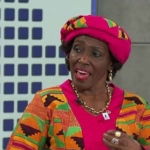
The passing of Nana Konadu Agyeman-Rawlings today (Thursday, October 23) marks the closure of an extraordinary chapter in Ghana’s political and social history.
Nana Konadu Agyeman-Rawlings was often referred to as the ‘Iron Lady’ of Ghanaian politics due to her activism in the 1980s and 1990s.
She was also the first woman to run for president in Ghana, one of many achievements that set her apart from the rest.
She was more than a First Lady; an uncompromising force, a dedicated women’s rights advocate, and a trailblazer who repeatedly challenged the political status quo, cementing her legacy as one of the most significant and formidable female figures in the nation’s post-independence era.
The Longest Serving First Lady
Born Nana Konadu Agyeman on November 17, 1948, in Cape Coast, Central Region, she received her secondary education at the prestigious Achimota School, where she met her future husband, Flt. Lt. Jerry John Rawlings.
READ ALSO: Nana Konadu Agyeman-Rawlings passes on
She went on to study Art and Textiles at the Kwame Nkrumah University of Science and Technology (KNUST) and earned an Interior Design Diploma from the London College of Arts in 1975.
Her subsequent academic pursuits, including a diploma in Advanced Personnel Management and a certificate in Development from GIMPA, reflected her intellectual drive.
Her life became intrinsically linked to Ghana’s political trajectory upon her marriage to Rawlings in 1977.
She served as First Lady across two distinct political periods: first, briefly, in 1979 during the Armed Forces Revolutionary Council (AFRC) era, and then for nearly two continuous decades, from December 31, 1981, to January 7, 2001, spanning the Provisional National Defence Council (PNDC) military rule and the two civilian terms of the Fourth Republic.
This longevity—the longest tenure in Ghana’s history—gave her an unprecedented and powerful platform to effect social change.
The Engine of Women’s Empowerment: 31st DWM
Nana Konadu Agyeman-Rawlings is perhaps best remembered as the founder and president of the 31st December Women’s Movement (31st DWM), established in 1982.
The movement was not merely a ceremonial NGO; it was a powerful, grassroots machine focused on mobilising and empowering women, especially in rural Ghana, driven by her belief that women held the key to breaking the cycle of poverty.
The 31st DWM’s achievements were concrete and widespread, transforming the role of women from mere recipients of aid to active political and economic participants:
- Grassroots Mobilisation: It mobilised an estimated two million women across the country, encouraging their participation in community and national decision-making. The Movement established over 870 pre-schools across the regions to free women to engage in economic activities.
- Economic Projects: The 31st DWM supported numerous income-generating activities and small-scale, village-level economic projects, encouraging women to save money for community development.
- Education and Health: It ran extensive functional adult literacy programmes to tackle high illiteracy rates among rural women and implemented public health programmes focusing on nutrition and immunisation.
- Legal and Political Reform: She was instrumental in advocating for legal changes, including the crucial role she played in the adoption of the Intestate Succession Law (PNDCL 111), which drastically improved the inheritance rights of widows and children—a vital shift away from traditional barriers where women often had no rights of inheritance upon the death of their husbands. Furthermore, through her efforts, Ghana became the first nation in the world to approve the United Nations Convention on the Rights of the Child (UNCRC) in 1991.
Agyeman-Rawlings often framed the movement as an essential political tool: “Before December 31, 1981, they had no power of influence in law or politics… I can see from the self-esteem and near arrogance of the women that now we’ve actually been able to break through this thick wall,” she once noted, highlighting the movement’s mission to empower.
An Unyielding Political Force and Trailblazer
After her tenure as First Lady, Nana Konadu remained a potent and uncompromising force within the political arena.
Her influence was so significant that some analysts characterised her political style as ‘femocracy’—a blend of feminist advocacy and political dominance.
Her independent political ambition was fully realised when she served as First Vice Chairperson of the National Democratic Congress (NDC) in 2009.
However, her relationship with the party, co-founded by her husband, fractured when she unsuccessfully challenged the late President John Atta Mills for the NDC flagbearership in 2011, a move that shocked the Ghanaian political establishment.
Her final, defining act of political courage came when she broke away from the NDC to found the National Democratic Party (NDP).
In 2016, she became the first woman in Ghana’s history to run for President, a monumental step that shattered a major political glass ceiling and inspired a generation.
Though securing a small percentage (0.16%) of the votes cast in 2016, he candidacy marked her as an enduring, fearless proponent for women’s leadership in the highest office.
Nana Konadu Agyeman-Rawlings’s life was a testament to grit, conviction, and an unyielding belief in the political and economic potential of Ghanaian women.
She leaves behind a nation deeply marked by her tireless activism, her bold political challenges, and the legacy of empowerment she gifted to millions of women across Ghana and the African continent.
She was, in the truest sense, a pioneer who carved her own path through the complex and often unforgiving landscape of Ghanaian politics.